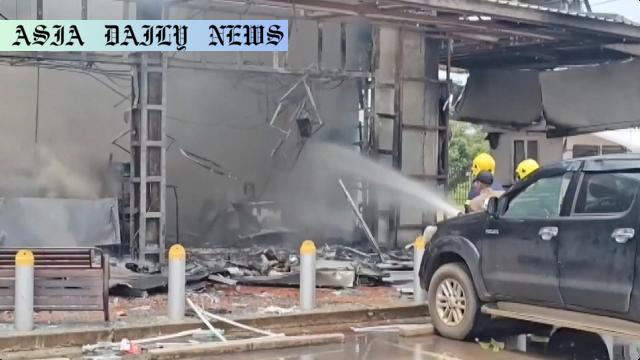Thailand-Cambodia border clashes: Clashes widen as violence escalates in disputed territory, affecting civilians and regions.
Clashes have escalated between Thailand and Cambodia, with shelling and fatalities reported.
Nearly 100,000 civilians displaced as violence impacts border regions.
UN and the US urge both sides to resolve disputes through dialogue.

Escalating Conflict: A Fragmented Border
The conflict along the Thailand-Cambodia border has seen alarming escalation since Thursday, leading to widespread violence and severe humanitarian consequences. This long-standing territorial dispute, rooted in the two countries’ historic struggle for borderlands, has now widened with armed conflict, shelling, and military engagement leaving civilians to bear the brunt. According to Thai health authorities, 11 civilians and one soldier from Thailand have lost their lives, with over 30 people injured. Thai airstrikes have been reported, and while there has been no confirmation of Cambodian casualties, Cambodian forces retaliated with shelling that targeted areas including a convenience store and even a hospital. The violence has deepened the plight of those living in border regions and sparked international concern.
Displacement and Humanitarian Fallout
The clashes have forced over 100,000 individuals to flee their homes along the border, following calls from the Thai government for immediate evacuation. Residents, primarily civilians, have sought refuge in schools and other temporary shelters. Yet, the scale of the humanitarian crisis continues to rise as basic needs of those displaced—ranging from food to medical care—are challenged by the sudden exodus. Local and international humanitarian organizations must collectively step forward to mitigate this widespread suffering. The border situation reinforces the devastating toll that territorial disputes wage on vulnerable populations.
Global Appeals for Restraint and Diplomacy
In the face of escalating violence, international bodies and nations have urged Thailand and Cambodia to exercise restraint and return to dialogue. United Nations Secretary-General António Guterres emphasized the necessity of resolving the territorial dispute in a spirit of neighborly cooperation, urging both countries to take steps toward peaceful resolution. Similarly, the United States expressed grave concern, imploring both nations to protect civilians and commit to diplomacy. Cambodian Prime Minister Hun Manet’s call for an emergency United Nations Security Council meeting underscores the urgency of the issue, as the region remains a microcosm of broader geopolitical tensions. Without immediate diplomatic interventions, the unrest threatens to spiral, further destabilizing Southeast Asia.
History of Territorial Disputes
The Thai-Cambodian border has long been a hotspot for territorial disputes stemming from colonial-era boundaries that remain contentious to this day. Previous incidents, such as the gunfight in May resulting in a Cambodian soldier’s death, highlight the fragile peace between the two nations. Historical grievances over landmarks and resource-rich territories continue to fuel animosity. This latest episode underlines the ongoing volatility within the region, risking a prolonged conflict. However, there remains hope for resolution through regional and international mediation that addresses both nations’ concerns.
Resolving Conflicts: The Need for Regional Cooperation
To address this crisis effectively, Thailand and Cambodia must engage in purposeful negotiations with the support of regional allies like ASEAN and international mediators. The resolution of such disputes lies not only in defining borders effectively but in fostering sustainable bilateral ties. Broader lessons can be drawn on international conflict resolution by prioritizing diplomacy and preventative measures over armed retaliation. ASEAN has a pivotal role to play in diffusing tensions, ultimately ensuring the stability of Southeast Asia.
Commentary
Understanding the Burden on Civilians During Conflicts
The escalating violence along the Thailand-Cambodia border is yet another grim reminder of how civilians remain the greatest victims of territorial disputes. Thousands have been forced to abandon their homes, leaving behind livelihoods and a semblance of normalcy. As shelling impacts areas like schools and hospitals, the shared suffering of these communities, regardless of nationality, highlights the human cost of unresolved disputes. It is essential to prioritize the protection of civilians, ensuring their safety and providing them with necessary resources.
Regional Instability: A Threat to Broader Cooperation
Prolonged conflict between Thailand and Cambodia not only endangers lives but also threatens regional stability in Southeast Asia. Both countries have much to lose if tensions escalate into prolonged warfare, including damage to their economies, tourism industries, and reputations as peaceful regional players. Besides, this unrest could complicate ASEAN’s broader ability to function effectively in promoting peace and cooperation. The global community must recognize that these disputes are interconnected and require unified efforts to bring sustainable peace.
The Urgency of Renewed Diplomacy
History has shown that military retaliation often deepens divides without offering long-term solutions. Thailand and Cambodia must seize this moment to commit to meaningful dialogue. Special attention should be given to mechanisms such as negotiations supported by ASEAN and international peacekeepers. By continuing to ignore diplomatic pathways, the region risks not only prolonged suffering for its people but also increased scrutiny from international forums. Resolution is not merely a political necessity; it is a moral imperative.


